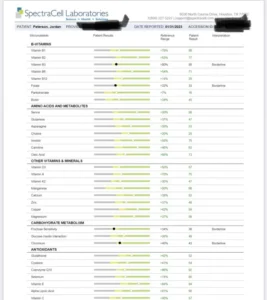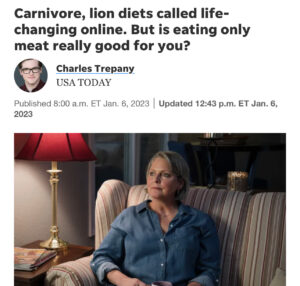You won’t feel better right away. The first two weeks can be hard. Sugar cravings (carbs, chips, soda, sugar) and dairy cravings (cheese) are intense. I also had soy cravings. These fade off in a couple of weeks but don’t underestimate them. Make sure you eat enough. If you’re craving foods just eat more. It doesn’t get rid of the cravings but it helps, and then you won’t be as likely to cave when you get hungry.
I started feeling better pretty fast… I would say I felt better after a week. Not all the way better, but minor improvement. The 3-4 week mark is when you really notice things though.
Don’t worry if you don’t feel better before 3-4 weeks is up. This is a big change for your body and a lot of those little microbes living inside of you are not going to be happy when you abruptly decide to stop feeding them. Try to remember with the cravings that it’s not you, it’s your microbiome. And f*ck a lot of those guys.
It helps if you remember you’re being manipulated into eating things that are bad for you because of what’s living inside of you. Then you can turn the cravings into thoughts like “screw you bacteria, STARVE AND DIE”. Or that’s what I did.
And remember, the cravings do lessen and then go away. It’s the first 2- 2.5 weeks that are the hardest.
Good luck!






First off thanks for your efforts with this blog. I have found many pointers that have helped manage my own situation and it is nice to see your journey backed with ‘real world’ evidence. I was originally diagnosed with Thyroid function problems and pushed down the pill popping path with no investigation of root cause. Through private blood tests and following an elimination diet my problems are clearly auto-immune in nature. Cutting gluten, dairy and soy have had profound results, improved mood, brain fog less of an issue, better skin (no cysts) etc. I was looking at IGG testing next to hopefully help identify other outlier foodstuffs that are not helping but am being put off by the negative publicity around the lack of efficacy and the cost. You’ve mentioned previously that you found value in the test – do you feel it is a worthy investment. Did cutting the flagged problematic foodstuffs make a difference?
Thanks in advance. Paul
I did an IgG test when I was in grade 5 and so many foods showed up in the “red” zone that we ignored it. I probably wouldn’t have needed a hip and ankle replacement if we hadn’t ignored it. I can’t recommend that test enough (especially if you have mood issues). If you haven’t eaten certain foods in a while some of your IgG levels can be artificially low (so if you start eating the foods again your levels could spike), so its best to do the test ASAP. It’s extremely unfortunate that there’s so much bad press involved with it because it helped me out so much. I didn’t do it until 5 months into eliminating foods, and it would have saved me from a really bad soy reaction. I used Rocky Mountain Analytical (it’s in Canada). I can’t recommend it enough. It’s worth the price! It really helps identify random food problems that would be hard to guess. Dairy and wheat show up for most people, but it helps you find things like white cabbage which is also a really nasty trigger for me. Good luck
Thanks for getting back, you’ve convinced me I’ll take the plunge, now to find a reputable tester in the UK, grrr it’s like the dark ages here. And again thanks for putting the effort in documenting your findings. Just wish I could have understood this better 20 yrs ago could have avoided loads of unnecessary pharma, cyst operations and aggro but Hey ho better off being better informed now than not at all! Cheers
That is excellent advice. The gut comunicates directly with hundreds of millions of brain cells we have in our digestive system and that is overpowering when giving up addictivve foods.
Since finding your blog a few weeks ago, I decided to try out the elimination diet. I’ve had cyclic vomiting syndrome for 10 years (I’m 19 now), and I’ve seen a lot of doctors trying to figure out what’s wrong with me. I was feeling pretty bad Wednesday and that’s when I started the diet. After eliminating a lot of the trigger foods suggested (like dairy, gluten, eggs, soy, nuts, beans, corn) and taking some supplements, I was feeling much better and thought I had avoided an episode. Sunday I tried tuna which I’ve never been too fond of and barely ate any of it. I hardly ate anything that day since none of the food seemed appealing, and I was trying to stick to a rotation diet as well as an elimination diet. I ended up going from totally fine to throwing up, and now it’s Tuesday and I’m just leaving the hospital. I know you’re not a professional and can only share your personal experience, but I’m wary about continuing the diet. I find it difficult to eat anything other than fruit in the mornings and greens especially kale and brussel sprouts make me feel ill. I’m worried collard greens and swiss chard will also make me feel sick. If I don’t eat enough food, it will most surely send me into an episode. I was also trying to do a rotation diet, so I wasn’t eating the same thing and contributing to more food sensitivity. I only really like eating chicken, fruit, romaine lettuce, and spinach. Everything else (except the stuff I shouldn’t eat like sugar, bread, eggs) makes me feel sick and is hard to finish. I’m not sure if I would be able to eat just meat and greens and get enough food to prevent me from going into a vomiting episode. I’m also scared of tuna now. I got the IgG test done about a week ago, and my doctor said they are slow and I probably won’t have the results for another 2 weeks.
So my questions: do you recommend sticking to a rotation diet or just eating the same foods daily as long as big triggers are avoided? Should I add back in other foods like tomatoes, beans, and rice plus keep the other foods I am currently eating like fruits and coconut since I have not gone as strict as you to make it easier for myself? Or should I start once I get the IgG results back? I got one done when I was 10, and the only things that showed up were eggs and ginger. Will the results change a lot after 9 years? Since college is starting up pretty soon, I really want to try this diet if it is able to prevent me from getting sick. Also, if this is not an autoimmune disease, would dieting be effective?
Lots of questions! Thank you for this blog and your insight.
Man, that’s rough. Okay.. Like you said, I’m not a health professional and can only tell you what happened to me and maybe what I would do in your situation. I do think the IgG foods are important so it’s really good you got that done. Did you do 200+ foods? My IgG reaction changed somewhat over a period of 10 years (with the main problematic ones staying the same).
As for the diet helping if it’s not autoimmune, my dad didn’t have an autoimmune disease, and neither does my husband and this diet has helped them immensely, so I don’t think it’s only helpful for autoimmune problems.
How I came up with my list of foods was: I cut out everything that I thought might be a problem, then I tried to reintroduce. I was so limited that I couldn’t do it on rotation. If I found a food I could handle, I kept it. You said you can do chicken, romaine lettuce, fruit (all fruit?), and spinach. Do you have a list of foods you can eat without causing a problem? If you do, you could start with those. If you don’t, you’re probably going to have to cut down to figure it out. Those 4-5 foods you mentioned were okay aren’t many foods but it’s a good enough start. If you only ate like that would you have any problems? If I were you I think I’d try just eating those foods for a couple of weeks and seeing if I can get my symptoms under control. The trick is cutting back until your symptoms are under control (obviously not starving as well – make sure you eat!). Then you reintroduce one food at a time back in. I don’t recommend a rotation diet because that’s not what worked for me. I’m so sensitive to so many foods that I didn’t have enough foods to go on rotation. More importantly though, I haven’t suddenly become sensitive to a food I’ve been eating (which is usually the reason for a rotation diet), and I’ve been eating like this for 2 years in September. I was worried about this but it hasn’t happened. I believe the reason this happens when something you eat minorly bugs you, and then you eat so much of it you notice a reaction. I don’t believe you suddenly develop a sensitivity. I could be wrong, but that’s my experience.
I don’t recommend adding in beans and rice until you get your IgG test back. Rice and beans are very gut irritating and both showed up on my IgG. I haven’t tried out tomatoes yet so I don’t really have an opinion on that!
When I have a flare up I eat a lot of bone broth (I have a post on that). If you can handle chicken, bone broth is really good for you and is probably the easiest thing to digest (broth for the flu right).
I also wouldn’t worry about not eating enough different types of foods. Even if you started out with chicken, lettuce, fruit and spinach, you’re getting a lot from those foods. And if that’s just what you’re starting out on, you’ll be able to eat more eventually.
If tuna bugged you, don’t try it for a while. Fish is very high in histamine and maybe you can’t handle that yet?
Send me an email if you want to chat more. Having a flare up when trying to figure diet out is really frustrating. It happens A LOT at the beginning too. I had a month long reaction once a month for a year at the beginning. So did dad. It’s hard but I do think it’s worth it. Definitely send me an email if you want to and we can chat more.
Thank you for posting symptoms! I’m on day 3 and feel like crap. I’m in the process of figuring out when to eat meats vs. vegetables. Today I learned that starting my morning off with a cucumber was not enough; and that I should start it with a hunk of meat. Still feeling symptoms of fatigue, irritability, and cravings (these are so bad I just want chocolate!). However, I feel so much better after eating some meat today.
Do you have any tips and resources about meal planning?
Hi I’m Jade from the Bahamas. I was diagnosed with RA in 2016 and have been heavily medicated since. I’m day 3 into the elimination diet and I am literally physically sick, nausea, jitters and depression. I’m assuming it’s sugar withdrawal. Do you think adding apples back in would hinder my joint pain improvements? I really want this to work as the medications are really to much and I’m still in pain I think them.
If you’re having too hard of a time, taper down. Bring back apples for the next 3 weeks and then try again. Sugar withdrawal hits different people differently and can be extremely unpleasant. Tapering down might be best for you. I tapered down by doing meat and greens and apples, then meat and greens, and then meat. It was easier that way but not as fast.
Leave a comment